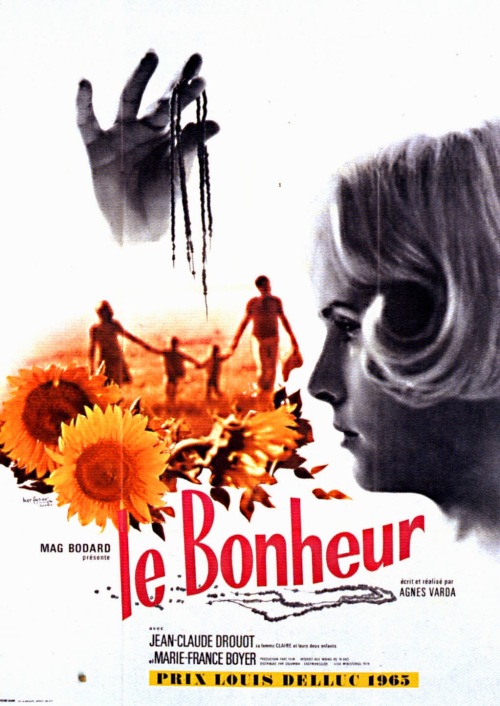Today I watched Agnès Varda’s Le Bonheur (1965)
With the exception of Annabel Jankel’s co-directing credit on Super Mario Bros. this is the first film helmed by a female director, which goes to show a serious problem within the film making world. Le Bonheur is a film about aFrench carpenter named Francois who has a young family and a beautiful wife, but finds himself in an extramarital affair with a woman from the post office. Though really this film is about happiness and the majority of it is people enjoying their lives.
The film actually has very little drama to speak of and while there is certainly an obvious way that an affair can be portrayed to create drama, this film does not do that. In fact the film seems to take a rather polyamorous stance on the whole affair as Francois shows that he is capable of being deeply and truly tender with both women while providing for his family. One might see a bit of a male power fantasy in Francois being able to love two women at once, but he also fits the stereotype of a woman’s ideal man; always able to show affection and compassion without ever being pushy, always giving his lady friends their space and the respect they deserve.
There is a very feminist way to view this film as it directly attacks the old moral structures of western society. While it may be a man who this film follows, the women who surround him define him, and his free loving nature is shown as the key feature which grants him his respectful nature. I would posit that Varda had the idea in mind that by showing men how great it is to be a free loving, woman respecting dude, she would make feminist ideals very attractive to a masculine viewer. I think this is a great idea and it is a very prescient tactic to not preach to the choir and instead make one’s statement in a manner that is understandable, palatable, and appealing to what could be the strongest opposition.
You could also make the argument that the film portrays male privilege as being so casual and so unopposed in society, but if this is the case the subtlety does the film no favours. If you as a film maker intend to make a message with a film, shouldn’t you target the people whose mind you might want to change? In this reading of the film I take issue with how non-obvious the moral center of the film itself lies, in this case the film would be preaching to the choir and I find that approach painfully boring and solipsistic.
Now I said before that this film has very little drama, now don’t take that to mean the film is boring, it absolutely is not. Varda’s imagery is alive and vibrant, painting with beautiful pastel colours and the natural beauty of the environment and the editing keeps the movie flowing with a rather snappy pace. The characters are also wonderful to spend time with, everyone is overflowing with happiness and it is truly infectious. Of course there is some drama in the film and it is pretty intense for the brief time it appears, the drama comes not from the breaking of social norms, but from random tragedy. In this moment the film has a very realist tone, tragedy comes out of the blue, people deal with it, recover, and move on with their lives.
Le Bonheur is a wonderful film that shows that you don’t need peril to be entertaining. It is a very lyrical film with an upbeat tempo, scored by some lovely Mozart mixing with jaunty French pop of the times. Jaunty is actually a great term to describe this film, as is giddy. There is a childlike naivete that works really well for the film, it works at being entertaining because it presents a world filled with wonder and characters who are just happy to be there. I would really like to hear from people about this film, is it a happy go lucky celebration of free love? Or is it a heavily veiled take down of the patriarchy? or both? 5/5
